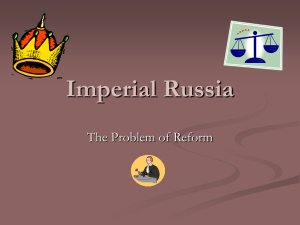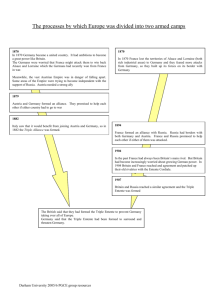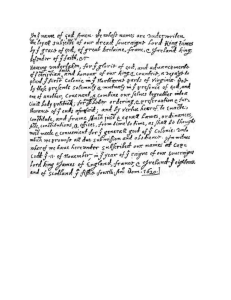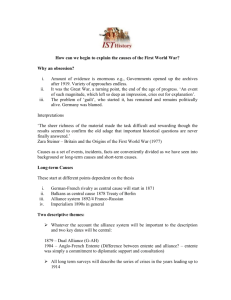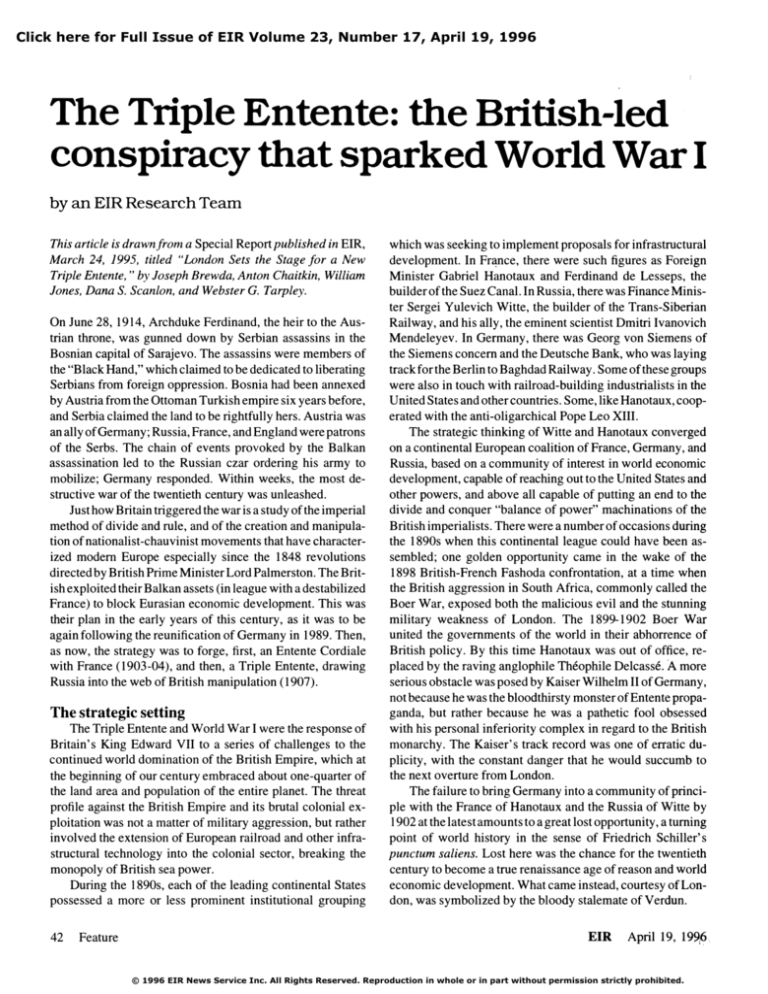
Click here for Full Issue of EIR Volume 23, Number 17, April 19, 1996
The Triple Entente: the British-led
conspiracy that sparked World War I
by an EIR Research Team
This article is drawnfrom a Special Report published in EIR,
which was seeking to implement proposals for infrastructural
March 24, 1995, titled "London Sets the Stage for a New
development. In France, there were such figures as Foreign
Triple Entente, " by Joseph Brewda, Anton Chaitkin, William
Minister Gabriel Hanotaux and Ferdinand de Lesseps, the
Jones, Dana S. Scanlon, and Webster G. Tarpley.
builder of the Suez Canal. In Russia, there was Finance Minis­
ter Sergei Yulevich Witte, the builder of the Trans-Siberian
On June 28, 1914, Archduke Ferdinand, the heir to the Aus­
Railway, and his ally, the eminent scientist Dmitri Ivanovich
trian throne, was gunned down by Serbian assassins in the
Mendeleyev. In Germany, there was Georg von Siemens of
Bosnian capital of Sarajevo. The assassins were members of
the Siemens concern and the Deutsche Bank, who was laying
the "Black Hand," which claimed to be dedicated to liberating
track for the Berlin to Baghdad Railway. Some of these groups
Serbians from foreign oppression. Bosnia had been annexed
were also in touch with railroad-building industrialists in the
by Austria from the Ottoman Turkish empire six years before,
United States and other countries. Some, like Hanotaux, coop­
and Serbia claimed the land to be rightfully hers. Austria was
erated with the anti-oligarchical Pope Leo XIII.
an ally of Germany; Russia, France, and England were patrons
The strategic thinking of Witte and Hanotaux converged
of the Serbs. The chain of events provoked by the Balkan
on a continental European coalition of France, Germany, and
assassination led to the Russian czar ordering his army to
Russia, based on a community of interest in world economic
mobilize; Germany responded. Within weeks, the most de­
development, capable of reaching out to the United States and
structive war of the twentieth century was unleashed.
Just how Britain triggered the war is a study of the imperial
other powers, and above all capable of putting an end to the
divide and conquer "balance of power" machinations of the
method of divide and rule, and of the creation and manipula­
British imperialists. There were a number of occasions during
tion of nationalist -chauvinist movements that have character­
the 1890s when this continental league could have been as­
ized modem Europe especially since the 1848 revolutions
sembled; one golden opportunity came in the wake of the
directed by British Prime Minister Lord Palmerston. The Brit­
1898 British-French Fashoda confrontation, at a time when
ish exploited their Balkan assets (in league with a destabilized
the British aggression in South Africa, commonly called the
France) to block Eurasian economic development. This was
Boer War, exposed both the malicious evil and the stunning
their plan in the early years of this century, as it was to be
military weakness of London. The 1899-1902 Boer War
again following the reunification of Germany in 1989. Then,
united the governments of the world in their abhorrence of
as now, the strategy was to forge, first, an Entente Cordiale
British policy. By this time Hanotaux was out of office, re­
with France (1903-04), and then, a Triple Entente, drawing
placed by the raving anglophile Theophile Delcasse.
Russia into the web of British manipulation (1907).
serious obstacle was posed by Kaiser Wilhelm II of Germany,
The strategic setting
ganda, but rather because he was a pathetic fool obsessed
A more
not because he was the bloodthirsty monster of Entente propa­
The Triple Entente and World War I were the response of
with his personal inferiority complex in regard to the British
Britain's King Edward VII to a series of challenges to the
monarchy. The Kaiser's track record was one of erratic du­
continued world domination of the British Empire, which at
plicity, with the constant danger that he would succumb to
the beginning of our century embraced about one -quarter of
the next overture from London.
the land area and population of the entire planet. The threat
The failure to bring Germany into a community of princi­
profile against the British Empire and its brutal colonial ex­
ple with the France of Hanotaux and the Russia of Witte by
ploitation was not a matter of military aggression, but rather
1902 at the latest amounts to a great lost opportunity, a turning
involved the extension of European railroad and other infra­
point of world history in the sense of Friedrich Schiller's
structural technology into the colonial sector, breaking the
punctum saliens. Lost here was the chance for the twentieth
monopoly of British sea power.
century to become a true renaissance age of reason and world
During the 1890s, each of the leading continental States
possessed a more or less prominent institutional grouping
42
Feature
economic development. What came instead, courtesy of Lon­
don, was symbolized by the bloody stalemate of Verdun.
EIR
April 19, 199,6
© 1996 EIR News Service Inc. All Rights Reserved. Reproduction in whole or in part without permission strictly prohibited.
King Edward VII: an evil demiurge
The Triple Entente was the personal cre­
ation of King Edward VII. It was he who set
up the British alliance with Japan, the Russo­
Japanese War, and the 1905 Russian Revolu­
tion. It was King Edward VII, acting as the auto­
crat of British foreign policy, who engineered
the Entente Cordiale between Britain and
France in 1903-04, and who then went on to seal
the fateful British-Russian Entente of 1907. It
was
King Edward who massaged Theodore
Roosevelt and other American leaders to help
bring about the U. S. -U. K. "special relation­
ship, " which dates from the time of his reign.
'
This diplomatic work was masterminded and
carried out by King Edward VII personally,
with the various British ministers, cabinets,
round tables, and other apparatus merely fol­
lowing in his wake. Edward had a geopolitical
vision in the Venetian tradition, and it was one
of brutal simplicity: the encirclement of Ger­
many with a hostile coalition, followed by a
war of annihilation in which many of Britain's
erstwhile "allies "-notably France and Rus­
sia-would also be decimated and crippled.
Edward VII died in May 1910, before he
could see his life's work carried through to com­
pletion. But he had created the war alliance of
Britain, France, Russia, and Japan, with support
from the United States, that would take the field
in August 1914. He had created the nightmare
world of crossed mobilizations among Ger­
many, France, and Russia. And he had created
a network of cothinkers, agents, and dupes in
every
chancery
in
England, Europe, and
America, who would, when the time came, push
the mobilization buttons and launch the war.
Edward VII's role as dictator of British for­
eign policy before the war, although denied by
recent biographers, was a matter of common
knowledge through the 1920s. During the last
months of Edward's life, Robert Blatchford, the
Britain's King Edward VII: World War I was caused by him, his geopolitics, his
editor of the Clarion, wrote in the Daily Mail of
diplomacy, his agents, and his system of alliances. The same strategy is being used
Dec. 14, 1909 that "the king and his councellors
have strained every nerve to establish Ententes
by the British oligarchy today, with the Balkans being, once again, a principal
jlashpoint.
with Russia and with Italy; and have formed an
Entente with France, and as well with Japan.
Why? To isolate Germany. "
The leading ambassadors and ministers of the Belgian
England a court policy pursued outside and alongside that of
the government. "
Ministry of Foreign Affairs clearly recorded their understand­
ing of Edward's project. Here is the view of Baron Greindl,
The Witte-Hanotaux alliance for progress
the Belgian ambassador to Berlin, as expressed in April 1906:
To better understand the enormity of Edward's crimes, let
"One is driven to the conclusion that British foreign policy is
us first examine more carefully what the opposing continental
directed by the king in person . . . there is undoubtedly in
European factions were doing, which constituted such a threat
EIR
April 19, 1996
Feature
43
to the British oligarchy.
From 1892 the prime architect of the rapid industrial de­
He collaborated closely with Pope Leo XIII's loyal friend
Cardinal Lavigerie in building the Cathedral of St. Louis in
velopment that occurred in Russia during the last decade of
Carthage, and in projects in Africa. Eventually, Hanotaux was
the last century, was Sergei Witte, who for 11 years, until his
promoted to the rank of foreign minister in 1894 by President
dismissal in 1903, would serve as Russia's finance minister.
Sadi Carnot, grandson of the great Lazare Camot.
During the Witte years, the Russian economy would experi­
As foreign minister, Hanotaux pursued a threefold policy:
ence a more rapid rate of growth than it had ever experi­
1) strengthening the Franco-Russian alliance begun by Presi­
enced previously.
dent Camot; 2) continuing the policy of detente with Germany
Witte began his service in the Russian bureaucracy as a
initiated by Jules Ferry; and 3) orchestrating a series of inter­
railroad manager. During the Russo-Turkish War (1877-78),
national agreements to consolidate the French position in
he was the sole manager of the Odessa Railway, over which
Western and Central Africa around Lake Chad, and to prevent
all traffic to the front passed, his work bringing him to the
the British from seizing the entire eastern side of Africa, from
notice of the czar. After serving in various capacities in the
Egypt to South Africa, from the Cape to Cairo, as their exclu­
railroad administration, Witte was appointed in 1892 Minister
sive domain.
of Ways and Communications. At the behest of Czar Alexan­
In 1895, Witte and Hanotaux succeeded in pulling to­
der III, Witte set up a Siberian Railroad Committee to begin
gether a coalition of Russia, Germany, and France, to prevent
the task of building a railroad to the Pacific. When he was
the Japanese seizure of the Liaotung Peninsula, an area of
appointed in October of that year to the post of finance minis­
Chinese Manchuria which Japan had won as booty for its
ter, Witte was given the means of realizing that program.
victory over the Chinese in the Sino-Japanese War of 1895.
As finance minister, Witte reformed the entire state of
As a result of the show of unity on the part of these three
Russian finances and transformed the Finance Ministry into
continental powers, Japan agreed to renegotiate its treaty with
a veritable chancellory of the realm, establishing extensive
China, renouncing any annexation of Chinese territory and
intelligence networks in all the major political and financial
thereby maintaining the territorial integrity of that country­
capitals of the world. His aim was to transform Russia from
a prerequisite for the Witte-Hanotaux development plans in
a backward peasant country, into a major industrial power.
the region.
The Franco-Russian rapprochement at the end of the pre­
Witte and Hanotaux then set up, largely with French capi­
vious decade helped to lay the basis for the Witte-Hanotaux
tal, the Russo-Chinese Bank, to provide China with a substan­
economic collaboration during the 1890s. Putting Russian
tial loan with which it could pay off its war indemnity to
finances on a sound footing, and working closely with Hano­
Japan, and thereby assuage Japanese anger at their loss of
taux, Witte found French capital markets open to Russia. Un­
the Liaotung Peninsula. Russia also signed a mutual defense
der the guiding hand of Witte, major loans were negotiated,
treaty with China, by which it would come to China's assis­
that were earmarked for expanding the Russian rail system.
tance if it were again attacked by Japan.
Between 1879 and 1892, only some 5,466 miles of new rail
On the basis of the Chinese good-will thus engendered,
lines had been opened up. Between 1892 and 1901, under
the Russo-Chinese Bank was allowed to lease the necessary
Witte's lead, some 14,814 miles of new rail lines were con­
territory for building the last leg of Trans-Siberian line,
structed, nearly triple the earlier amount. This was a more
through Manchuria, creating for that purpose a new company,
rapid rate of railroad construction than any other country ex­
the Chinese Eastern Railroad. France was also able to sign a
cept the United States had ever experienced.
series of agreements promoting its commercial expansion in
The real core of that system was the planned Trans-Sibe­
Indochina and in China, opening up China to increased trade
rian road which, at its completion in 1902, would stretch some
over the border with French-controlled Indochina and build­
5,542 miles from Chelyabinsk in the Ural Mountains to Vladi­
ing new rail lands in the south of China.
vostok on the Pacific coast. But the Trans-Siberian was more
Japan, however, was not meant to be a loser in Witte's
than simply a rapid transit through the vast Siberian spaces. It
complex plan for Asian development. It was Witte's intention
was what Lyndon LaRouche would characterize as a "land­
to engage the Japanese in a treaty by which both nations would
bridge " to Asia. By rail, the overland journey from London
profit from the commercial benefits of the new rail access to
to Shanghai would be twice as fast and two and a half times
the European markets. To do this, Witte was even willing
cheaper than the sea route. The prime vehicle for trade with the
to sacrifice Russian commercial interests in Korea, acquired
Orient would rapidly shift from the slower sea routes, always
during the Sino-Japanese War, in deference to Japanese inter­
under the guiding eye of the British Navy, to the land-based
ests in that nation. But an alliance with Japan found strong
routes through continental Europe and the Russian Far East.
opponents in the coterie surrounding the czar.
Gabriel Hanotaux, French foreign minister for a large part
On the other side of the Pacific was another power, fast
of the 1890s, had worked closely with his mentor, Prime Min­
becoming a Pacific power, the United States of America. With
ister Jules Ferry, to establish a colonizing policy for Africa
the establishment of a Russian-U.S. alliance during the Amer­
based on the principle of development through infrastructure.
ican Civil War, it was generally understood by nationalist
44
Feature
EIR
April 19, 1996
gro�pings in Russia and in the United States that this alliance
The ring around Germany had been closed. Bismarck's
would become of great value as a trans-Pacific alliance, as
old "nightmare of the coalitions" and a two-front war was
both nations began to "railroad their way " to the Pacific
now reality. With the help of Izvolski, Edward embarked at
Ocean. This would effectively squeeze the British out of Asia.
once on a new attempt to start a general war. This began with
But in order for Witte's Far East policy to succeed, the
Izvolski's Buchlau bargain with Austria,made in September
situation in Europe had to remain stable. The formation of
1908 and revealed a month later. By this deal, Austria was
what Witte called the "continental league," comprising
given the go-ahead to formally annex Bosnia-Hercegovina,
France, Germany, and Russia, was a prerequisite for that
which had been occupied by Austria after the Congress of
policy.
Berlin, but not annexed. But when Austria did this, Serbia,
In an appeal to Kaiser Wilhelm in 1897 to help him create
which wanted Bosnia-Hercegovina, protested. Austria and
such a league,Witte said: "In order to attain this . . . we must
Serbia went to the brink of war,mobilizing their armies. Ger­
first make all haste toward the establishment of solid united
many restrained Austria,and Russia felt too weak for war at
relations between Russia,Germany,and France. Once these
that time. Germany actually mediated the dispute. But Ed­
countries stand together in a firm and steady union,undoubt­
ward's agents soon concocted a legend that Germany had
edly all the other countries on the continent of Europe will
humiliated Russia with the threat of war.
join this central union and thus form a union of the whole
As a result of this Balkan crisis of 1908-09,the Russian
continent which will free Europe from the burden which she
slavophiles turned their rage more and more against Germany,
imposes on herself on account of reciprocal rivalry. "
which they saw as blocking their desired path of expansion
Although the German Kaiser would often pay lip-service
into the Balkans. The Greater Serbia agitators went wild. The
to the notion of the "continental league," he never really un­
Austrian government concluded that Serbia was a threat to its
derstood, to his-and the world's-great misfortune, the
existence,and had to be crushed. This was the pattern which,
overriding significance of such a concept.
after a second Moroccan crisis of 1911 and after the Balkan
wars,led to war in 1914.
Edward's encirclement of Germany
Edward proceeded on several fronts to encircle and neu­
If Edward VII had had his way, it would have been five
powers against an isolated Germany. Edward VII never aban­
tralize Germany and to prevent the consolidation of a conti­
doned an Austrian option,which,if it had succeeded,would
nental bloc oriented toward Eurasian development:
have left Berlin with no allies at all.
•
He incited the Russo-Japanese War,and his agents fo­
mented the 1905 Russian Revolution. Britain signed a treaty
For a few moments during early August 1914, Kaiser
Wilhelm realized what had happened:
with Japan,which gave Japan a free hand for Admiral Togo's
"England,Russia,and France have agreed among them­
sneak attack on the Russian base of Port Arthur in early 1904.
selves . . . after laying the foundation of the casus foederis for
With Russia destroyed by the war and racked by social
us through Austria . . . to take the Austro-Serbian conflict for
unrest (stirred up by British agents), Edward moved to en­
an excuse for waging a war of extermination against us. . . .
•
snare the French. Hanotaux's attempt to limit British expan­
That is the real naked situation slowly and cleverly set going
sionist aims in Africa had been sabotaged by the ill-fated
by Edward VII and . . . finally brought to a conclusion by
mission of French Captain Marchand to Fashoda, Sudan, in
George V. . . . So the famous encirclement of Germany has
1898, ordered by Hanotaux's chief rival, Delcasse, during a
finally become a fact, despite every effort of our politicians
short period when Hanotaux was out of power. French society
and diplomats to prevent it. The net has been suddenly thrown
had been weakened by the Dreyfus affair,which had triggered
over our head,and England sneeringly reaps the most brilliant
rampant Germanophobia in the French population. With the
success of her persistently prosecuted purely anti-German
help of Delcasse and British stooges Georges Clemenceau
world policy against which we have proved ourselves help­
and Paul Cambon,a deal was struck,bringing the French back
less,while she twists the noose of our political and economic
into the British fold. In 1904, the two countries signed the
destruction out of our fidelity to Austria,as we squirm isolated
Entente Cordiale.
•
even of him who is to be destroyed as its result! Edward VII
Edward left no stone unturned in his efforts to isolate
there have been people who believed that England could be
is stronger after his death than am I who am still alive! And
rocco.
•
in the net. A great achievement,which arouses the admiration
Edward incited two Franco-German conflicts over Mo­
Germany,drawing Norway,Sweden,Spain,and Portugal into
the British orbit.
won over or pacified,by this or that puny measure!"
France,Russia,Japan,the United States,and other great
On the same day in April 1904 on which the Anglo­
nations were used by Edward VII as geopolitical pawns,and
French Entente came into effect, Edward VII met with his
they have suffered immeasurably as a result. Ninety years
•
agent,Russian Foreign Minister Alexander Izvolski,to pro­
after Edward's ententes, citizens and statesmen must learn
pose an Anglo-Russian combination. The result was the
the lesson of how the British monarchy and oligarchy orches­
Anglo-Russian Entente,signed in September 1907.
trated the catastrophe of 1914.
EJR
April 19, 1996
Feature
45

